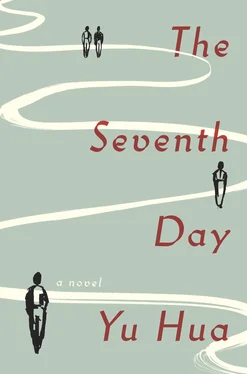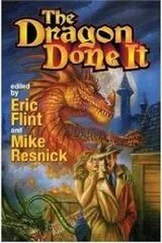One evening my father neither sighed nor groaned. Instead he talked quietly about some key moments in our lives, such as how he had heard me crying on the railroad track and carried me in his arms to Li Yuezhen’s house. It was that evening too that I learned how, when I was four years old, he had abandoned me in order to get married. When he got to this point tears trickled from his eyes and he was stricken with self-reproach, saying over and over again, “How could I have been so heartless?”
I pointed out that I had left him too, joining that family up north, so the score was even. In the darkness he patted my hand, saying that for me to go to the home of my birth parents didn’t count as abandoning him.
He gave a little laugh. He recalled how clever I’d been to cover myself with leaves to keep myself warm that time he left me by that dark rock. This comment somehow refreshed my memory, and suddenly I remembered the stones, trees, and grasses, and the barking dog that had made me so fearful. I said it wasn’t that I was cold, but that I was afraid, for a dog kept barking constantly.
“No wonder,” he said, “that you had leaves over your head as well.”
I chuckled, and so did he. “I’m not afraid of dying,” he said to me evenly. “I’m not afraid of that at all. What I’m afraid of is not being able to see you.”
The next day he left without saying goodbye. He said nothing at all, not leaving even a note, dragging away the little life left in him. In the days that followed I kept kicking myself for being so inattentive. Shortly before this, my father had me take out a new railroad uniform from the wardrobe and put it next to his pillow. I hadn’t given this a second thought, assuming he just wanted to admire the last new uniform he had been issued prior to his retirement. But I overlooked his longstanding custom — that he liked to put on a new uniform when faced with some important task.
On the day that my father left home, there was a fire in our city — at a department store just half a mile from my little shop. It was afternoon when I heard news of the disaster, and by then I was in a very anxious state, because my father had yet to return home. A horrible thought came to mind — could he have gone to the department store? It seemed just possible. My birthday was coming up, and my father might well have wanted to buy me a present.
I shut up shop for the night and dashed over to the department store. The silver structure was now reduced to a charcoal hulk, as thick smoke billowed upward. The flames had been largely extinguished, but hoses from a dozen fire trucks were still spurting long jets of water on the charred wreckage. Ambulances lined the street, along with several police cars. Fire ladders were propped up against the building and firemen were already inside searching for survivors. Some of the injured had been carried out and ambulances were speeding off, sirens wailing.
Every intersection next to the department store was crammed with people, and everyone was talking about the fire. Standing among them, I heard only snatches of conversation: some said the fire started around ten in the morning, while others said it started at noon. I shuttled back and forth among the onlookers, listening as they discussed the cause of the fire and guessed the number of casualties; it was dark by the time I returned home.
The TV news that evening had a segment on the department store fire. According to an official source, the disaster was triggered by an electrical short circuit at nine-thirty in the morning. The store had only just opened at the time, the news anchor said, and there were few customers inside. The majority were successfully evacuated and only a handful were trapped. The precise casualty figure was still under investigation, the report said.
My father did not return home that evening, and I was on tenterhooks the whole night. In the morning the TV news had the latest on the department store fire: seven dead and twenty-one injured, with two in critical condition. At lunchtime they released the names of the dead; my father was not among them.
But other reports were circulating on the Internet. Some said there were over fifty dead, while others claimed there were twice that. Many people online criticized the authorities for underreporting the figures, and some noted the Work Safety Administra  tion’s definition of accidents: a single episode that caused between three and nine fatalities counted as a “fairly serious” accident; over ten deaths constituted a “serious” accident; and a death toll of over thirty was classified as an “extremely serious” accident. The authorities were castigated for trying to downplay the gravity of the disaster by limiting the reported fatalities to seven. Even if the two in critical condition were to die of their injuries, that would only make a total of nine, confining the fire to the category of “fairly serious” accident and thereby averting any unpleasant repercussions on the career prospects of the mayor, the Communist Party secretary, and other bigwigs.
tion’s definition of accidents: a single episode that caused between three and nine fatalities counted as a “fairly serious” accident; over ten deaths constituted a “serious” accident; and a death toll of over thirty was classified as an “extremely serious” accident. The authorities were castigated for trying to downplay the gravity of the disaster by limiting the reported fatalities to seven. Even if the two in critical condition were to die of their injuries, that would only make a total of nine, confining the fire to the category of “fairly serious” accident and thereby averting any unpleasant repercussions on the career prospects of the mayor, the Communist Party secretary, and other bigwigs.
Rumors were spreading like wildfire on the Internet. Some people said the relatives of the unreported dead had been threatened, while others claimed they had been given huge wads of hush money, and still others listed the names of unreported fatalities  —again my father’s name was absent.
—again my father’s name was absent.
He had now been gone two days, and I began to mount a search. First I made inquiries at the railroad station, thinking the staff there might have seen him, but I drew a blank. He had become so rake-thin, even people who knew him might fail to recognize him. Then I went to see Hao Qiangsheng and Li Yuezhen, who had just got back from Guangzhou, having passed their visa interview at the U.S. consulate there, and were now attending to the sale of their apartment and preparing to make the long flight across the Pacific to join their daughter. They were shocked by my news. Hao Qiangsheng wouldn’t stop sighing, and Li Yuezhen burst into tears. “Son,” she said, “he doesn’t want to be a burden on you.”
The most likely explanation, they felt, was that my father was set on returning to his roots — going back to the ancestral village where he was born and where he grew up. I should try looking for him there, they thought.
I passed the shop on to someone else and took a long-distance bus toward my father’s old home. I had visited once when I was small, but my father’s parents had no warm feelings toward me, thinking I had wrecked his life. My father had five siblings, but their relationship also was strained. My grandfather had worked on the railroad, at a time when state policy allowed an employee’s child to get a job on the railroad if the parent took early retirement. Of his six children, my grandfather selected the youngest — my father — to inherit his position and thereby angered the other five. That’s maybe why my father never took me back home a second time.
By now, my grandparents had both passed from the scene. My father’s five siblings were still living where they always had, but their children had moved away years earlier. Migrant workers in an assortment of different cities, they had put down roots elsewhere.
I got off the bus in a bustling county seat and took a taxi to my father’s village. We rode along a road that was broad and level and paved with asphalt concrete, a huge contrast to its condition on my previous visit, when it was a mud track rutted with holes so big that our car was bouncing around all the time. Just as I was marveling over the progress made, the taxi came to a sudden stop. The asphalt road had come to an end and the crude, potholed surface of the past reappeared in front of me. No county official was going to visit a place this far out in the boondocks, the taxi driver said, so the asphalt ended here. Seeing my bewildered city-boy expression, he explained that country roads are built just for the convenience of leaders when they venture out to conduct inspections. The village that I wanted to go to was another three miles farther on, he said. He pointed down the narrow track ahead. “No leader would dream of going to a godforsaken place like that.”
Читать дальше

 tion’s definition of accidents: a single episode that caused between three and nine fatalities counted as a “fairly serious” accident; over ten deaths constituted a “serious” accident; and a death toll of over thirty was classified as an “extremely serious” accident. The authorities were castigated for trying to downplay the gravity of the disaster by limiting the reported fatalities to seven. Even if the two in critical condition were to die of their injuries, that would only make a total of nine, confining the fire to the category of “fairly serious” accident and thereby averting any unpleasant repercussions on the career prospects of the mayor, the Communist Party secretary, and other bigwigs.
tion’s definition of accidents: a single episode that caused between three and nine fatalities counted as a “fairly serious” accident; over ten deaths constituted a “serious” accident; and a death toll of over thirty was classified as an “extremely serious” accident. The authorities were castigated for trying to downplay the gravity of the disaster by limiting the reported fatalities to seven. Even if the two in critical condition were to die of their injuries, that would only make a total of nine, confining the fire to the category of “fairly serious” accident and thereby averting any unpleasant repercussions on the career prospects of the mayor, the Communist Party secretary, and other bigwigs.









